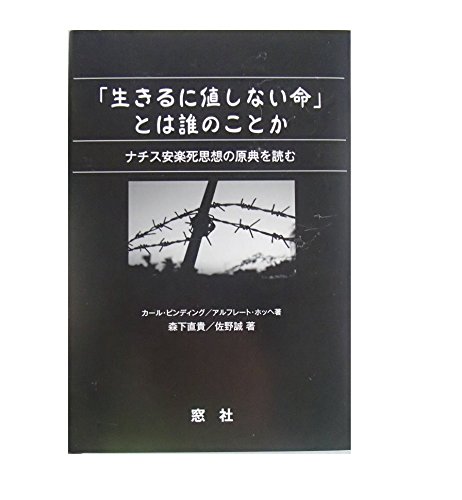1 0 0 0 OA 石井誠士会員のご逝去を悼む
- 著者
- 森下 直貴
- 出版者
- 日本医学哲学・倫理学会
- 雑誌
- 医学哲学 医学倫理 (ISSN:02896427)
- 巻号頁・発行日
- vol.24, pp.134, 2006-10-24 (Released:2018-02-01)
1 0 0 0 OA 「健康概念の再検討-病気と幸福の間-」のまとめ(健康概念の再検討-幸福と病気の間-)
- 著者
- 倉持 武 森下 直貴
- 出版者
- 日本医学哲学・倫理学会
- 雑誌
- 医学哲学 医学倫理 (ISSN:02896427)
- 巻号頁・発行日
- vol.22, pp.161-162, 2004-10-18 (Released:2018-02-01)
1 0 0 0 OA 「脳死移植」論議と「社会的合意」の条件
- 著者
- 森下 直貴
- 出版者
- 日本医学哲学・倫理学会
- 雑誌
- 医学哲学 医学倫理 (ISSN:02896427)
- 巻号頁・発行日
- vol.12, pp.48-61, 1994-10-01 (Released:2018-02-01)
Recently, there has been vigorous discussion throughout Japan on the question of 'brain death and organ transplantation'. However, considering the process which shows various differences of how to think among people, must be pointed out an essential lack of reflection on the concept of 'Consensus'. This lack is natural as far as all other discussions on public affairs are concerned. This paper aims at determining the sense of 'Consensus' (the best one is a from of inventing some compromise through negotiation), at criticizing 'pluralism' (or Liberalism) that is a certain background for that sense, and as this result, at inquiring conditions under which the 'Social 'Consensus' could be formed. These conditions are as follows: (1) the logic of arguments (2) a value-right system supporting arguments or discussions (3) institutions forming discussions Furthermore, the above mentioned view is applied to the Japanese discussion on 'brain death and organ transplantation', and several desirable proposals about it are made.
- 著者
- カール=ビンディング アルフレート=ホッヘ著 森下直貴 佐野誠訳・著
- 出版者
- 窓社
- 巻号頁・発行日
- 2001
1 0 0 0 OA 「健康」は「ウェルネス」か? : 健康概念の全体的な枠組みに関する考察
- 著者
- 森下 直貴
- 出版者
- 日本生命倫理学会
- 雑誌
- 生命倫理 (ISSN:13434063)
- 巻号頁・発行日
- vol.8, no.1, pp.19-28, 1998-09-07 (Released:2017-04-27)
- 参考文献数
- 25
- 被引用文献数
- 1
Why does it seem to us that many diciplines or domains involved in Bioethics, e.g. medical ethics, health care ethics, research ethics, public health ethics, or environmental ethics, etc., do not have close connections with each others. My answer is that a clear and whole conceptual framework of 'health'has been lacking in Bioethics. In this paper, through critically analysing and assessing of such influential definitions or theories as WHO's and L. Nordenfelt's concerning 'health', G. Canguilhem's on "biological normativeness"and A. Sen's on "capabilities", I try to put forward a whole framework of wellness and health. In my theory, we have the 'wellness' of personal 'life' within mutual relationships among three life levels, namely, biological life level, human living level and life as a whole level. Under these relationships, 'health' is defined as 'norm' of wellness/illness on the biologically individual life level. Although 'health' essentially is the norm, it also usually means a well-state according the norm. Furthermore, the biological level is so related with the other two levels, that the wellness or illness on itself generally supports the possibility of wellness or not on the human living level and, on the contrary, is restrictively valued by the latter. This is, I think, the reason why the idea of health has been seen complex or ambiguous.
1 0 0 0 OA 西周の《区別-連結》の哲学 ―「実証主義」と「天の思想」を包括する体系 ―
- 著者
- 森下 直貴
- 出版者
- 浜松医科大学
- 雑誌
- 浜松医科大学紀要 (ISSN:09140174)
- 巻号頁・発行日
- vol.31, pp.1-21, 2017-03-30
In Japanese history of philosophy, Amane Nishi is regarded not as a genuine philosopher but as an enlightenment-thinker, whereas he is unanimously praised as “the father of Japanese philosophy.” The reason is that he was the positivist as well as the utilitarian. However, he expressed the faith in “Ten (i.e. Heaven),” Japanese metaphysical or divine entity. The concept of “Ten” is inherited from Kogaku school of Confucianism in Tokugawa era, and derived from Kukai’s esoteric Buddhism in ancient era. Therefore, Nishi’s philosophy remains vague yet, as long as the relation between positivism and “Ten” within his thought is not elucidated. This paper condenses Nishi’s philosophy into three theses, aiming to comprehend it completely. The first is〈 Relation i.g. “Ri (Reason)”〉 thesis. Nishi raised it against Shushigaku school of Confucianism. Compering this thesis with thoughts of Shushigaku, Kogaku, or Conte and J.S.Mill, Nishi’s philosophy is characterized as the perspective of distinguishing and relating every thing in the actual world. The second is〈Knowledge / Faith〉 thesis, his fundamental view on religion. Interpreting implications of this thesis, the structure of relationships among science, metaphysics, religion and morality is lighted up. Their co-related structure of every thing, which is mediated by “Ri” and suspended by “Ten,” is the Nishi’s very system of philosophy. The third is〈 Feeling = Brain〉 thesis. This is the basis of bringing〈 distinction-connection〉 into the world. Here is followed how this thesis makes sciences unified, building a bridge between physiology and psychology. And also how it makes utilitarian ethics systematic, integrating personal, inter-personal and societal levels. The core of Nishi’s philosophy exists in his perspective of〈 distinction-connection〉. This is one of the pictures of the “philosophical thinking.” From this perspective, he tried to divide and integrate all actual beings, including human activities, for example, science and philosophy, metaphysics and religion, physics and psychology, physiology and psychology, simple and complex feeling, religion and morality, morality and law, and so on. His “system of philosophy” embodies itself in such inclusiveness. And in Japanese metaphysical tradition, the actual world substantially means “Ten and Chi (i.e. Heaven and Earth)”. Therefore, his philosophy also includes the first attempt of “Japanese metaphysics.”
1 0 0 0 生命ケアの比較文化論的研究とその成果に基づく情報の集積と発信
・本研究は,21世紀を「生命ケア文化再構築の時代」ととらえ,個の自己決定と社会的な相互扶助の両者のバランスがとれた,わが国の文化風土にあったケア文化のあり方を探求してきた。西洋と東洋の死生観の相違がしばしば問題にされるが,それはいずれかが勝っているというのではなく,分析や合理性を重んじる西洋的思考と,総合や直観を重んじる東洋が互いに学びあう必要がある。一方で,文化の差を自覚しつつ,同時に,文化ナショナリズムに陥ることなく,いのちをめぐる諸問題の国際化にも対応していかなければならない。「アジア的」とか「日本的」といった類型化・固定化に陥ることなく,西洋のケア文化の歴史的深みと現代的展開の意味も十分に理解しなければならない。21世紀の生命ケア文化再構築は,グローバル化のなかで,比較文化論的視点に立った柔軟な発想で進めていく必要がある。以上のような研究成果を,国際シンポジウムを開催するなど,国際的に開かれた討議空間のなかで検証してきた。・臨床学的アプローチのなかでは,<施設から在宅へ>が後戻りできない流れであり,それを支えるコミュニティ・ケアとスピリチュアル・ケアが極めて重要となってきていることが明確になった。・21世紀ケア文化を担う新しい世代に対しては,「いのちの大切さ」を漠然と教えるのではなく,いのちが向かう先にある<いのちの美しさ>を芸術作品などを通して感得しこの世に在ることへの大きな信頼を取り戻し生きる力を高めるような生命ケア教育が必要である。例えば理科教育のなかでも,自然の奥深い構造を示すとともに,それらについての科学的知見と技術的応用が社会にもたらす影響についても具体例に即して考える教育プログラムと授業展開が必要であろう。以上のような成果を研究成果報告書,ホームページや著書,公開講座,授業展開などの形で発信してきた。


